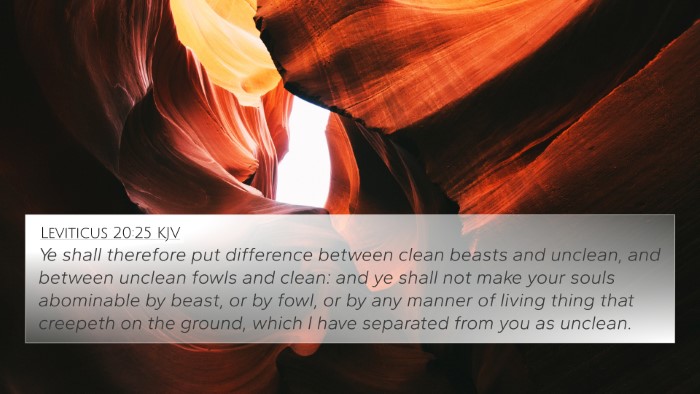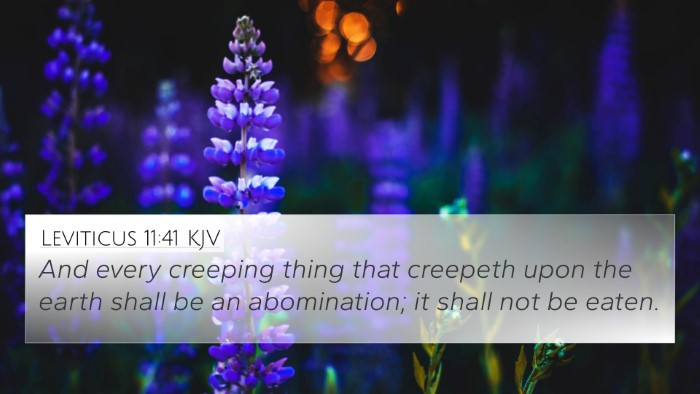Understanding Leviticus 11:43
Leviticus 11:43 states, "You shall not make yourselves abominable with any creeping thing that creeps on the earth. You shall not make yourselves unclean with them, lest you be defiled by them." This verse centers on the dietary laws given to the Israelites, emphasizing the importance of holiness and separation from things considered unclean.
Summary of Meaning
This verse instructs the Israelites about maintaining their purity by avoiding certain animals deemed unclean. The concept of being "abominable" reflects a strong moral and spiritual directive from God, aimed at setting His people apart. Observing these laws was more than a matter of diet; it represented broader themes of obedience, identity, and the sanctity of God's creation.
Commentary Insights
- Matthew Henry: Henry notes that these laws serve to instill a sense of reverence and respect for God's creation. By avoiding unclean animals, the Israelites demonstrate their commitment to God's commands. The aim is to cultivate a lifestyle that reflects God's holiness.
- Albert Barnes: Barnes highlights the significance of cleanliness in relation to spiritual purity. He points out that this directive is rooted in the Israelites' covenant relationship with God, emphasizing the necessity of maintaining this covenant through obedience to His laws.
- Adam Clarke: Clarke elaborates on the implications of these dietary laws for the Israelites, suggesting that they were meant to reflect their unique status as God's chosen people. He emphasizes that avoiding these animals symbolizes a broader separation from corruption and sin.
Connection to Other Scriptures
Leviticus 11:43 can be linked to various other Bible verses that emphasize the importance of staying clean and pure in the sight of God. Below are some significant cross-references that provide further insight:
- 1 Peter 1:16: "For it is written: 'Be holy, because I am holy.' - This verse reaffirms the theme of holiness that is echoed throughout Leviticus.
- Hebrews 13:9: "Do not be led away by diverse and strange teachings, for it is good for the heart to be strengthened by grace, not by foods." - This passage speaks to the spiritual implications of dietary laws and their relevance.
- Romans 14:14: "I know and am persuaded in the Lord Jesus that nothing is unclean in itself, but it is unclean for anyone who thinks it unclean." - Here, Paul addresses the transformation of dietary laws in the light of Christian liberty.
- Mark 7:18-19: "And he said to them, 'Then are you also without understanding? Do you not see that whatever goes into a person from outside cannot defile him?' - This New Testament reference discusses the reinterpretation of ceremonial cleanliness.
- 2 Corinthians 6:17: "Therefore go out from their midst, and be separate from them, says the Lord, and touch no unclean thing." - This emphasizes the call for believers to maintain their distinctiveness and purity.
- Isaiah 52:11: "Depart, depart, go out from there; touch no unclean thing; go out from the midst of her; purify yourselves, you who bear the vessels of the Lord." - A calling for God's people to separate from impurity in their living.
- James 4:8: "Draw near to God, and he will draw near to you. Cleanse your hands, you sinners, and purify your hearts, you double-minded." - Here, the call to spiritual purity highlights the relevance of physical cleanliness.
Thematic Connections
Leviticus 11:43 allows for significant thematic connections within the biblical narrative:
- Holiness: The frequent call for holiness reverberates through both the Old and New Testaments, underscoring God's desire for a pure people.
- Separation from Sin: The dietary restrictions symbolize a broader separation from sin and impurity, which is a recurring theme throughout scriptures.
- Obedience: The necessity of obeying God's commandments is a principle upheld consistently throughout both Testaments.
- Identity in God: The connection between obedience to dietary laws and Israel’s identity as God’s chosen people parallels New Testament themes of identity in Christ.
Conclusion
In summary, Leviticus 11:43 emphasizes a fundamental principle of purity in both a physical and spiritual sense. The cross-references provided enrich the understanding of this verse, linking it to broader themes that resonate throughout biblical scripture. These connections encourage deeper exploration and provide tools for a more comprehensive understanding of scripture, facilitating a journey through the interconnectedness of biblical texts. For those seeking to engage in a cross-referencing Bible study, the outlined relationships can serve as a valuable guide.




